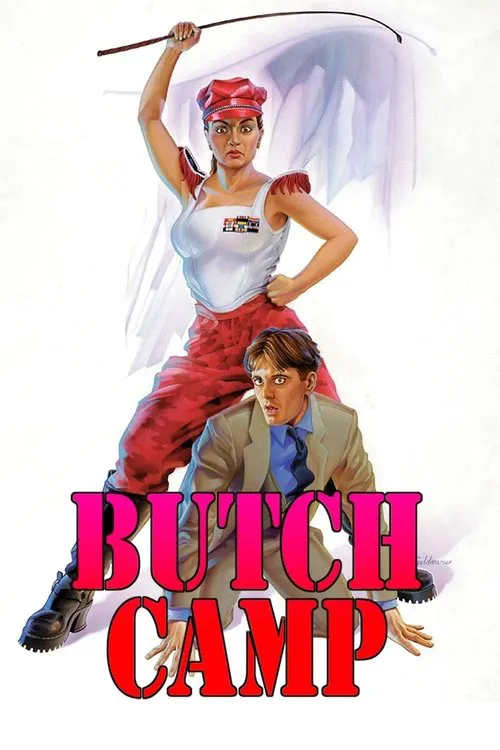Butch Camp

Plot
"Butch Camp" is a 1996 American comedy film directed by Stephen Shustak, exploring themes of self-discovery, empowerment, and identity. The movie revolves around the character of Jack (played by Stephen Borrello), a timid and effeminate gay man tired of being bullied and harassed by straight people, particularly in his job as a bank teller. Growing increasingly frustrated with his life, Jack finds an ad for "Butch Camp," a program designed to transform wimpy gay men into assertive and confident individuals. Determined to turn his life around and assert himself, Jack decides to enroll in the program, which promises to equip him with the skills and knowledge to become the gay man he was meant to be. The story follows Jack's transformation journey as he immerses himself in the world of "Butch Camp." He is surrounded by a group of fellow gay men, each struggling with their own insecurities and fears, yet united by their desire to break free from societal pressures and expectations. Under the guidance of their charismatic instructor, Jack undergoes a rigorous training program, which includes workshops on confidence building, assertiveness, and masculinity. However, things quickly take an unexpected turn as Jack becomes increasingly conflicted about his true self. Striving to fit in with the new image he's trying to create, Jack starts to shed his effeminate mannerisms and adopts a more masculine persona. As he progresses through the program, Jack becomes consumed by the need to suppress his inner "feminine" self, leading him to question the true purpose of "Butch Camp." Meanwhile, Jack develops a close bond with his fellow campers, particularly a charismatic and confident gay man named Billy (played by Tony Fields). Billy becomes Jack's mentor and confidant, guiding him through the ups and downs of the program. However, as Jack grows more assertive and confident, he starts to realize that Billy's masculinity may not be as authentic as it seems. Throughout the film, the line between authenticity and artificiality becomes increasingly blurred. Jack and the other campers begin to question the true purpose of "Butch Camp" and the expectations that come with being a gay man. As they navigate the complexities of identity, masculinity, and social pressures, the group members come to realize that true confidence and self-assurance cannot be manufactured or forced. The film culminates with Jack confronting the director of "Butch Camp," who is revealed to be a charismatic and flamboyant character with a hidden agenda. The director, played by Michael Touissem, is shown to be exploiting the insecurities of the campers, preying on their desire for self-improvement and acceptance. In the end, Jack comes to a realization about his own identity and the nature of "Butch Camp." He decides to take a chance and be true to himself, embracing his effeminate qualities and rejecting the artificial constraints of the program. As Jack sheds his pretenses and finds confidence in his true self, he is met with acceptance and understanding from his fellow campers. The film ends on a poignant note, with Jack and the other campers embracing their individuality and rejecting the stifling expectations of societal norms. "Butch Camp" becomes a powerful statement about the importance of self-expression and authenticity, challenging the traditional notion of masculinity and urging gay men to be their true selves, regardless of societal expectations.
Reviews
Recommendations



